Tips for College Tours: Make Your Best Decision

Best Questions to Ask Your College Recruiters
The Ideal College Audition Timeline
Help Your Theatre Students Prep for College Auditions
ARTIST CITIZEN INNOVATOR



Tips for College Tours: Make Your Best Decision

Best Questions to Ask Your College Recruiters
The Ideal College Audition Timeline
Help Your Theatre Students Prep for College Auditions




CODY CHEN

The Joffrey Ballet General Manager

BETSY BRANDT

TV: Marie Schrader on Breaking Bad, Life in Pieces, The Unicorn, Love, Victor; FILM: Magic Mike, Quest
JON MICHAEL HILL

BROADWAY: Superior Donuts (Tony Award
Nom., Outer Critics Circle Award); TV: Det. Marcus Bell on Elementary, Detroit 1-8-7, 61st street
MALLORY PORTNOY
Originated the role of Gertie Cummings in the Tony-award-winning Broadway revival of Oklahoma!
JACK MEHLER Lighting and Scenery Designer for Live Entertainment, Consultant for Performance Venues

SHANOLA HAMPTON
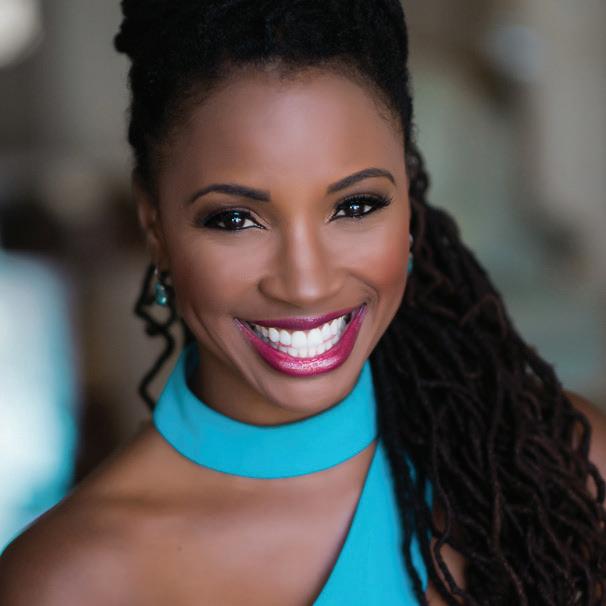
TV: Veronica on Shameless, Miami Medical, and related numerous film credits
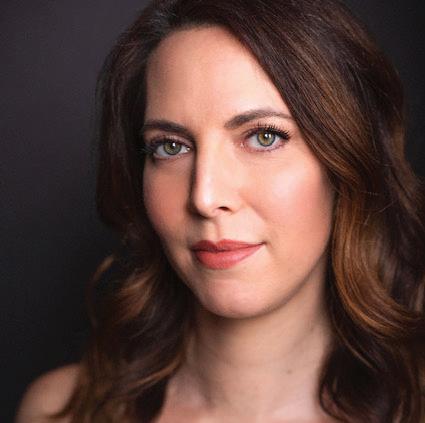


Make the most of every tour in person or virtually.
 by Laura Enstall
by Laura Enstall
Visiting a college campus is the ideal way to get a solid feel for the school, the town, the programs, and more. While COVID protocols are still shifting it’s important to be sure you understand tour details for wherever you want to visit.
Get all the details ahead of time so you know how to be prepared and to get the most out of your tour. Here are tips to maximize your tour experience:

Contact the theatre department to set up a theatre tour and a meeting with the faculty. If you want to major in theatre, check out the theatre facilities and meet the faculty, if possible. Your admissions officer may set this up for you or you might need to do it yourself, depending on the school.
Have questions prepared to ask the faculty. You want to be prepared with questions about their theatre program specifically. Here are some questions you can ask:
1. How many students do you accept into your program? Be specific about which program(s) you’re interested in whether it’s acting, musical theatre, tech theatre, or theatre education.
2. What performance opportunities are there for freshmen?
3. How are students taught about the business of theatre?
4. How does your program help students who are graduating find work in the field?

5. Are there opportunities to perform / audition for summer work?
For a full list of questions and my free college-tour template click here.
Bring along a notebook or create a note in your phone and keep track of what you like and dislike about every school. This is a very simple, yet effective way to stay organized throughout your college process. If you’re auditioning for theatre programs, you most likely will be visiting and auditioning for many schools. Staying organized is essential. Trust me, it’ll hard to remember details about each program six months after your visit.
Bring your headshot and resume just in case you have a chance to share it! When you meet with the theatre faculty, they might ask for your headshot and resume. If you have one, bring it along. If you don’t have one, it’s okay but you can easily put together a resume. Here’s a template
Ask if you can audit a class (sit in). You’ll need to set this up ahead of time, but many schools will allow you to sit in classes in the theatre department. This is a firsthand way to observe the faculty’s teaching style and see how the students work with the faculty. You can also try to visit the campus during the school year and see a performance. This is a great way to get to know the theatre program.
If you can’t visit the campus in person, for whatever reasons, here are ways to maximize your virtual campus experience:


Many, if not all universities are now offering virtual tours of their campuses. Spend time doing the virtual tour of the campus. Explore the school’s website thoroughly and see what it has to offer. Take as much time as necessary and dig deep.
Find the social media handles (Instagram/Facebook) for the theatre department and the university. Look for additional info there. Many times students will do takeovers, Q&As or “a day in the life” to give you a better feel for the student experience.
Ask to set up a virtual meeting with the theatre department to get more information and ask questions. During this meeting, you can also ask if you can speak to current students (or be connected with current students) so you can ask them questions about the school and program.

Connect with students online or over Zoom. Ask the theatre department to put you in touch with students so you can get a feel for the program from the student’s perspective. They may even give you their own personal tour!
If you’re unfamiliar with the city or town where the campus is located, do some online exploring! Google what’s nearby. Search for the nearest grocery store, distance from the airport (if you’d be flying to and from school), local restaurants. Check how far hotels are from campus for family and friends’ visits. Get to know the surrounding area.
Some of the campuses are open but aren’t giving tours. In this case, walk the campus on your own self-guided tour. You may not be able to go into buildings but you could at least drive around and walk around outside to get a feel for the campus.
As we all have learned, situations will continue to change in this post-COVID world of ours. Campus restrictions will change so be sure to check with the university and the local restrictions before you plan a trip.

Bring your talent to the premier progressive hub for the performing arts at the Ithaca College School of Music, Theatre, and Dance.
AUDITION AND INTERVIEW DATES
December 2, 2023
January 26–28, 2024 (NYC)*
February 3, 2024
February 5–8, 2024 (Chicago)*
APPLICATION DEADLINES
February 10, 2024 (Los Angeles)*
February 17, 2024
February 24, 2024
November 1, 2023 — Early Decision Theatre Administration, Theatre Production & Design, Theatre Studies

December 1, 2023 — Regular Decision Acting, Musical Theatre

February 1, 2024 — Regular Decision Stage Management, Theatre Administration, Theatre Production & Design, Theatre Studies
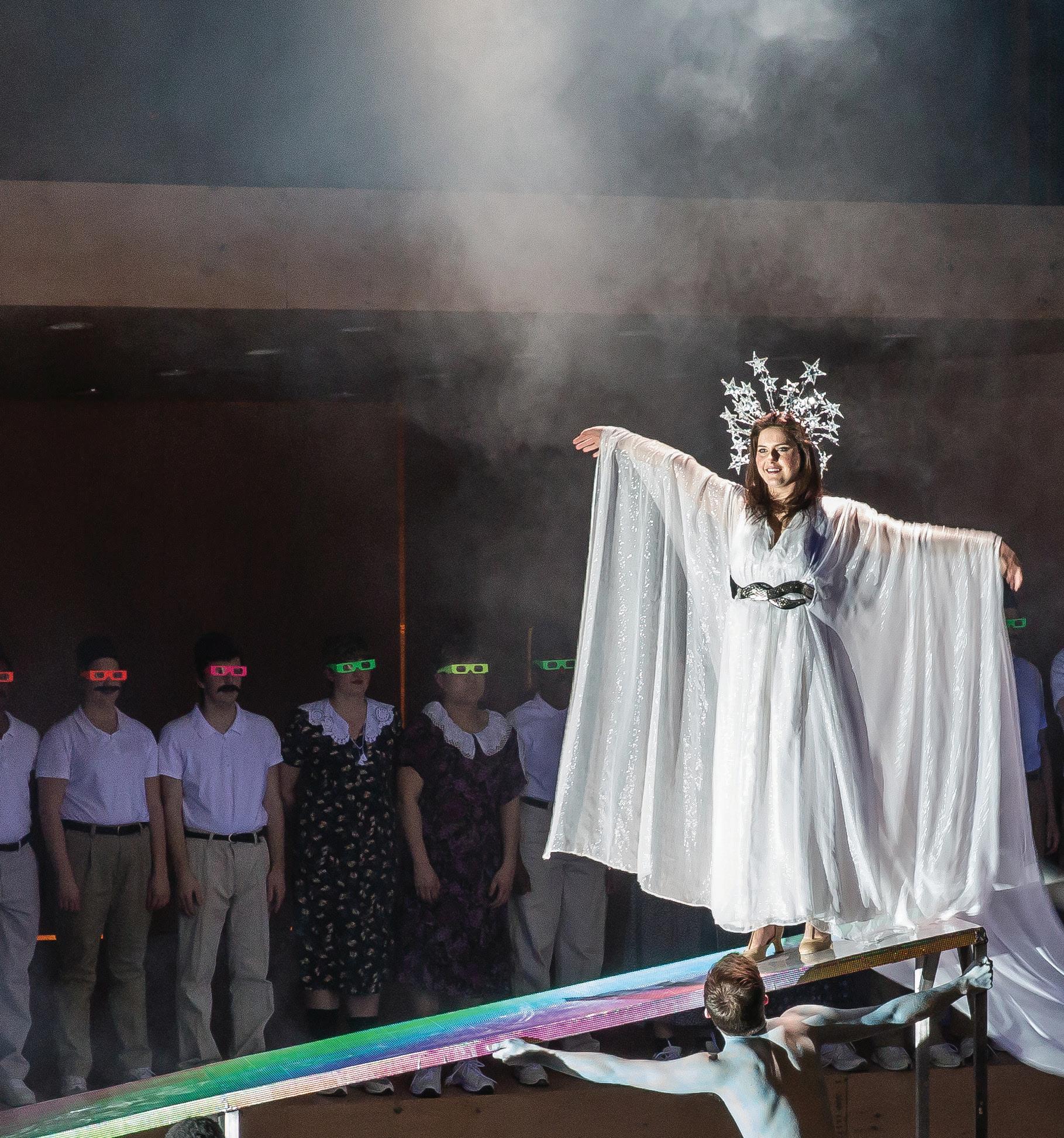
*Acting and Musical Theatre Only
ithaca.edu/mtd/apply mtd@ithaca.edu
W h e r e P a s s i o n m e e t s P u r p o s e
Scholarships & renewable academic merit awards up to $7,500 per year available in: Dance, Media, Music, Studio Arts & Design, and Theatre

Auditions & interviews held in February
Apply Today!
plu.edu/arts-scholarships


You’ll shine if you’re prepared!

Make your time spent with college recruiters useful. You need to be prepared to ask what’s most important to you. First review the Reality Tips and then create a plan for yourself.


Maybe you wish your college recruiters could tell you just the answers to these two questions:
1. Will I be happy at this school?
2. Will the school accept me?
Of course, they can’t. But if you plan your time with them and do the right research then you’ll get closer to those answers on your own. Before we share the best questions to ask your college recruiters, here are tips to keep in mind:
Put your questions in a note on your phone or write them down on a notecard. Use the method that works best for you.
There’s a lot happening during ITF. And there’s a lot happening in your personal life. Your prepared questions will let you shift gears quickly when it’s your turn with the college recruiters.
Your prepared questions show you’re interested and eager to find out more about the school. In fact, a lack of your participation in the conversation can go against you. The recruiter may think you’re just going through the motions!
That way, when you review your notes, you’ll be comparing “apples to apples.” Random questions won’t let you compare each recruiter’s answers.
Feel free to ask
They may share opportunities about their institution’s awards that you didn’t even know existed.
You can ask about financial aid, student life, the academic experience, etc.
Stay
It’s fine to ask if they attended the college and if they want to share anything about their own experience there. Beyond that, leave the personal questions off your list.
You want to ask thoughtful and pertinent questions. But trying to put the college recruiters on the spot is a bad idea. It’s important to keep in mind that college recruiters can and may report back any troublesome interactions they have with potential students.

Read through the following questions and carefully choose the ones that will help you make the most of your time with college recruiters.
1. What theatre degrees does your school offer?
2. Is theatre the major? Is musical theatre the major?
3. If you offer a BFA vs. BA what are the advantages of each? Why is the one you offer more useful?
4. What are the performance opportunities for undergrad students? Can I perform as a freshman? Is it ensemble-only? Leading roles?
5. How many plays vs. how many musicals does the college produce each year? What’s the typical production calendar look like? When are the shows?
6. Are there student productions? Does the school support independent productions? Will the school sell tickets? Is there performance space available for my production on campus?
7. Do my extra-curricular activities and hobbies influence my chance of being accepted into the theatre program?
8. Am I allowed to audition for professional works while still in school? If I get hired, can I pause my schooling and return after my contract?
1. How would you describe campus culture? What is student life like?
2. What can you tell me about on-campus living? What are the dorms like and how many are on campus? How many students to a dorm room?
3. Are there part-time work opportunities within the program? How might I earn money doing something relevant to theatre on campus or nearby in town?
4. What about off-campus living? What’s available to freshmen? What do most students do after freshman year?

1. What differentiates the college from others?
2. What upcoming changes to curriculum, planned on-campus construction, etc., will affect students, either positively or negatively?
3. What do students enjoy most about this school? And, as a follow-up, what do you hear that students dislike most about the school?
4. If I need to pause my education for a semester, can I come back without having to reapply?
5. When do I have to declare a major? Can I change majors later?
6. Are there study-abroad opportunities?
7. How would you describe the faculty overall?



Knowing what to do, and when, are short-term goals that you can help your students work toward in their college audition process. As an audition coach, I tell the students and their adults that this process is unique. “You’ve never done anything like this,” and then I try to assure them, “and you’ll never have to do this again!”
There is a distinct timeline that is important to know and follow if your students are planning to audition for musical theatre or acting programs across the country or even in state. While some programs do not require a rigorous audition like we will discuss,
many of them do. Remember that every school is different, with different requirements. THIS is one of the biggest issues to learn and accept. What your students did for School A will likely be different for Schools B, C, and D.
Even though you, as their teacher, may not be as involved in the college audition process as the student’s coach or adults, understanding the timeline is one way you can empathize with what they’re attempting to accomplish. If it’s in your bandwidth, you can also be one more adult supporter on their audition team.

Junior year is when preparation for college auditions begins in earnest. I’ve found that the best time to begin college audition prep is at the start of second semester of the student’s junior year. In this early stage, the student begins gathering audition material and finding songs and monologues that are age appropriate.
You can remind the student that they might already have material in their audition book. A lighthearted, “no need to reinvent the wheel” may help them see they have already done some good work toward their college goal.
If you have younger students who already know they’re interested in college theatre programs, a friendly suggestion to them and their adults to begin looking at schools even in the freshman and sophomore years is wise. I encourage families to consider incorporating a college visit if they’re on a road trip. Or they can check out local schools during those summers. Usually there is information on the school’s website about summer tours. Be sure to check if you need reservations or if you can just show up.
Summer prior to senior year, which is now for rising seniors, is when applications open. In most cases the application open date is August 1. What the student needs to be working on prior to the application date are:
These applications are often long, timeconsuming, and tedious about details needed. Starting this summer gives the student time to go about the process calmly and accurately. And to gather any important info they need to get from their adults.
Yes, many writers think they do their best writing under a deadline. However, the reality is that there will be the writing of the esssays, and then the revising to polish the essays. Start now.
The student needs for prescreen submissions in the fall. (The start of the school year and early fall are always jammed with activities and the process of getting adjusted to a new school year.)
In September of senior year, the student should be preparing for prescreens and getting a slot (which is like a reserved time for their prescreen). If the prescreen is passed, the student will have the opportunity to schedule an audition with that school. Remember that not every school will require a prescreen; find out which ones do.

October is a great time to film prescreens. Filming earlier is fine if the student’s material is film ready. A few programs might have an early decision deadline in October; I can’t say it enough: check each school’s particular requirements and deadlines.
Mid-January is when most students will begin (if they haven’t already) scheduling their auditions. Some auditions might be virtual. Virtual auditions are acceptable and can be scheduled, too.
November and December are when most prescreens will be due. Many schools follow the Musical Theatre Common Prescreen Check each school’s website for requirements. Common deadlines are November 1st and 15th; December 1st and 15th.
Late December and early January are often quiet because of winter break.
Late January and February are when students audition for school programs. The National Unified Auditions are held in New York (January 2024), Chicago and Los Angeles (both in February 2024). These unified auditions allow students the opportunity to audition for many schools in one weekend. In 2024 there are currently 25 schools involved. Be sure to check out the link.
March may still offer some audition times. Some students will hear back from schools this month.
First start by researching programs. Have the student make a preliminary list of schools they’d like to learn more about. Second, suggest that they begin working on songs and monologues that are age appropriate. This dual assignment “start” helps them begin to understand that there are going to be a lot of moving parts during college audition preparation.
April is when the final schools may notify students of admittance or denials. Now is the time for the student to review all the options they have been offered. It’s important to remind students they are within their rights (according to the school) to decline any offers they do not wish to accept. That is, an offer is just that. The student is not obligated to accept it.
Review the above timeline and mark key deadlines and to-do items for each month. Provide the student with this same information in whatever way best fits their processing and planning method. Let them know you’re willing to be their accountability partner and check in with them on key dates (if this is something you have time to do).
May 1st is decision day! Students should commit by May 1 to the program of their choice.
No, it all comes down to training. Ultimately, whatever your student puts into a program is what they’re going to get out of it. The letters on the paper, BFA or BA, do not matter in the professional audition room. What matters is proof of solid training and honed technique.
• CommonApp is a platform students use to apply to multiple programs:
https://www.commonapp.org/
• Musical Theater Common Prescreen has a lot of important info for the prescreen process in one place:
https://getacceptd.com/musical-theatercommon-prescreen
• National Unified Auditions landing page has details about all three major cities’ auditions:
https://unifiedauditions.com/

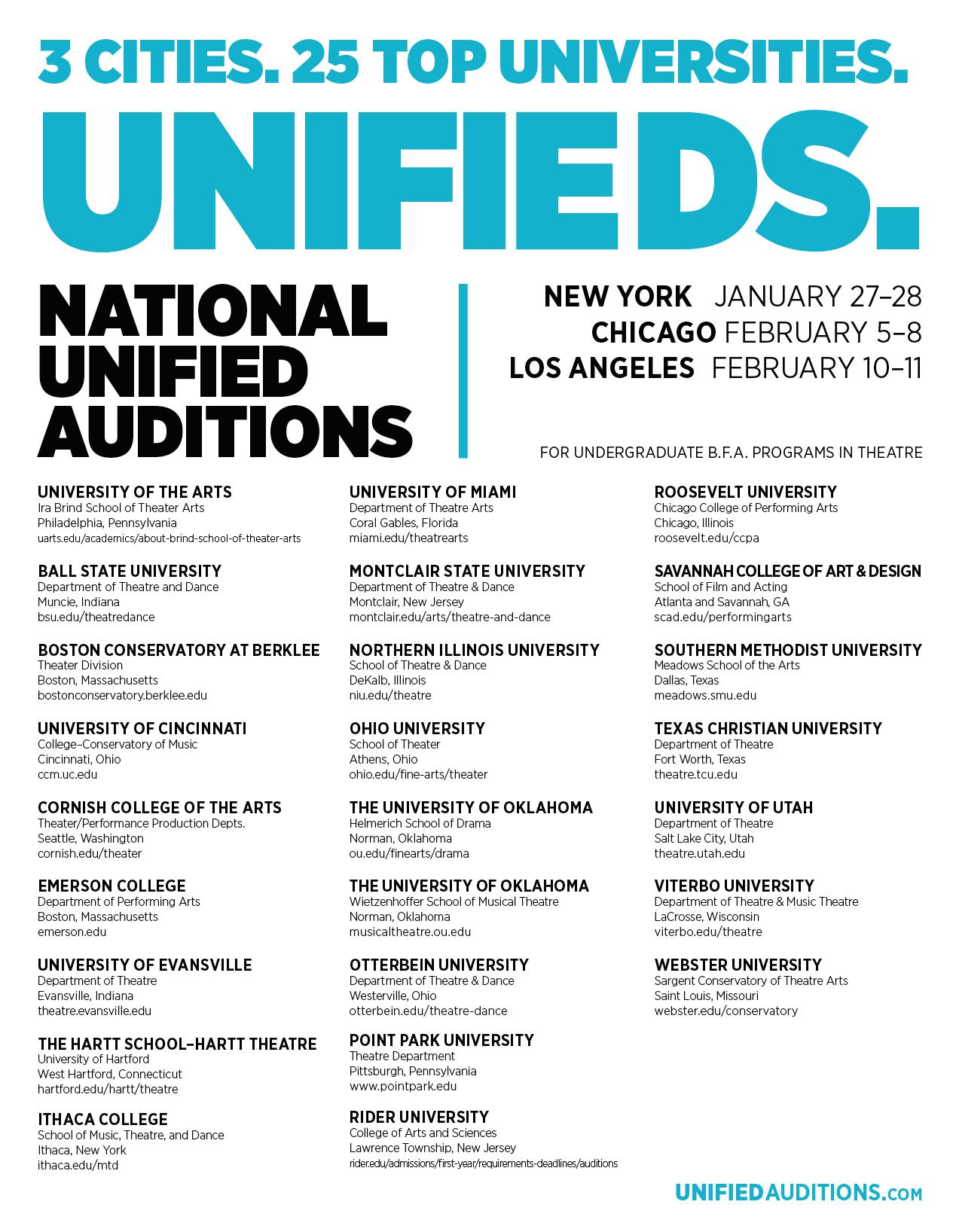
Helping your students succeed is at the heart of all you do; thank you! Here are ways to help your seniors stay on track with college auditions and participate in their senior year activities. (Plus tips to help younger students get a jump on the college audition process.)

I’ve seen it happen too many times that a senior misses college audition deadlines because their senior year is just
so busy! As the school year begins, students should be working on their college essays and getting applications completed. Meanwhile, auditions for their senior shows start happening. Then the whirlwind of rehearsals for the fall show begin. However, the college audition timeline is steadily ticking away.
Here are three ways to help your students prep for college auditions:
With so much information available online it’s easy for students to get overwhelmed by choice. So, to combat the tidal wave of info they might be drowning under, students sometimes defer to “Top 10 Theatre Programs” lists, a viral video on TikTok, or fixate on going to the school of their favorite Broadway actor.
Sure, there may be good info at their fingertips, but you can help them turn down the noise of too much info to find meaningful opportunities.
What’s most important is the student finding a school and a program where they feel comfortable. Ideally, they’ll find a place that feels like home for the four years they live and learn there.
Yes, some students will transfer even after doing a thorough search. But I believe many transfers happen because students focused their school choice more on the prestige of the program rather than deciding whether the school was an all-around good fit for them.
Though the student may dream of being “far away from home,” it’s amazing how many students realize that a 3-hour drive might work just as well to feel more on their own.
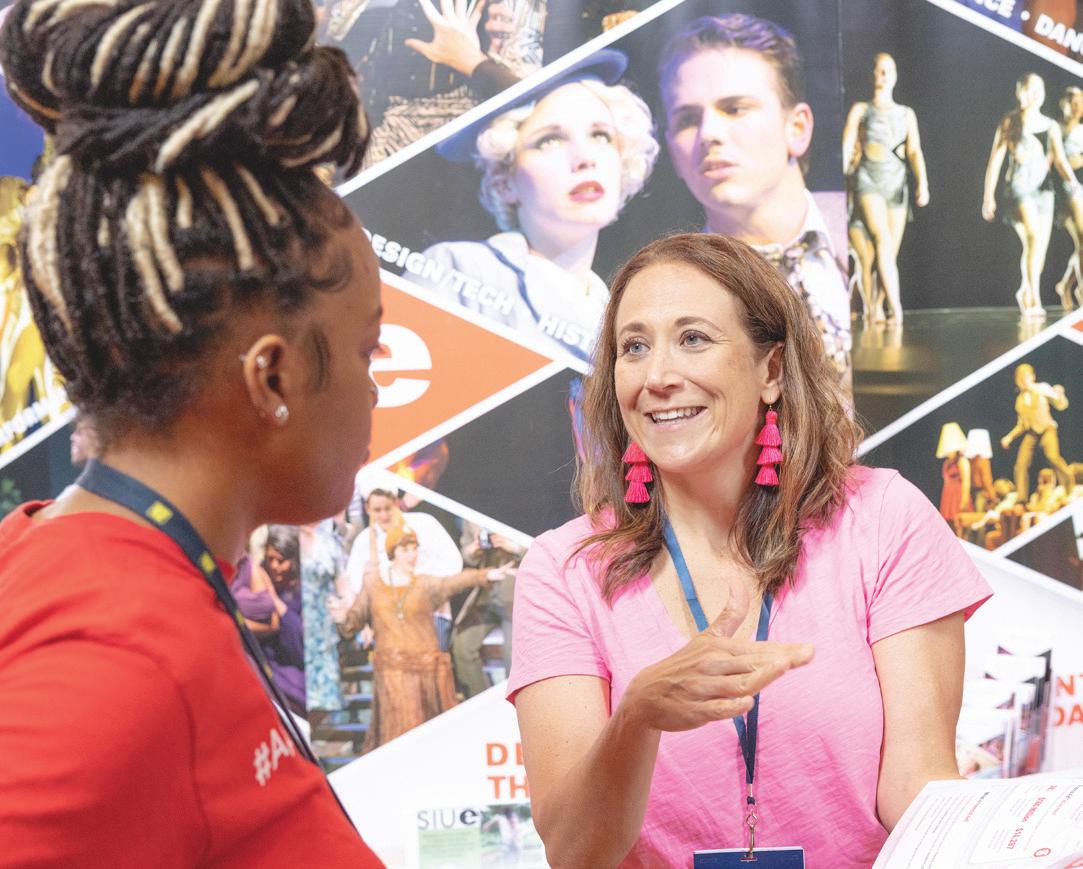
Also, a local working actor at career day can be a valuable source of firsthand information for students.
There are more than 40 schools on the list. There’s a downloadable spreadsheet of requirements, too. This site is a great place to start.
These universities do simultaneous auditions at three different locations across the country.
Many students and parents want to know if it’s possible to double major in Theatre (or Acting or Musical Theatre) and something else. There are a variety of reasons to seek a double major, but the bottom line is that every school is different.
Explain this to your students and encourage them to search the program department’s website for information about double majors. Emailing the school is another way to get details. And rolling old-school and making a phone call could connect the student to a helpful contact at the school.
If double majoring is your student’s goal, have them include this question with their prepared questions (in a notebook or on a phone) for every in-person school tour they take.
I’ve found that if a student is a BFA musical theatre or BFA acting major, it might be tricky to double major because of the course curriculum and track that students need to follow. Minoring in a field might be more doable in a highintensity major program.
Clear communication is key throughout this whole college audition process. Reminding students that it’s okay to stop and ask questions whenever they are unclear helps them have a kind of permission to not know everything already.
Senior year is especially full of activities, obligations, and emotions. Miscommunication can get students flustered; they don’t want to let anyone down (parents, teachers, their friends, themselves). And once flustered, the college audition process can begin to go sideways.
As adults, we know that if students communicate their needs that most things can be worked out. And we also know that this process of clear communication is fragile. I like to remind students and their adults that college audition prep is like adding a part-time job to the students’ lives!

Here are my tips for the students I coach through the college audition process:
(yes, an old-fashioned paper calendar with lots of room to write on). Write down all commitments, rehearsals, voice lessons, dance classes, coaching sessions, deadlines, major school assignments, mustattend fun activities, etc. Then post the calendar where the student and their adults see it daily. Yes, the visual is an accountability tool. (Digital calendars are fine for backup, but seeing everything written down tends to make it more real for everyone.)
If you get into one of the high school shows and then find out later that you have a college audition date that conflicts with a rehearsal date (which you’ll have on your master calendar), let your director know immediately. Teachers, your students don’t
have much control over college audition schedules. If/when a student comes to you with this conflict, please be prepared. Try to work around the missed rehearsal. If necessary, let the student kindly know that missing won’t work. It’s a dose of reality to be told they simply can’t do it all; and yet you can help them process their disappointment and prioritize what’s best for their future education. Your clear communication will be a gift.
Yes, this is a chance for students to practice independence. And it’s also a huge undertaking that their adults and teachers can assist them with. When a student asks for help, the adults can guide how to prioritize efforts and even lend a hand by taking on a task. You know that students continue to need guidance even as they are spreading their wings to fly!
Teachers, you are an integral part of the Educational Theatre Association’s effort to make #TheatreInOurSchools a program that helps students succeed. Your passion and support make profound differences in the lives of the students in your classrooms.
